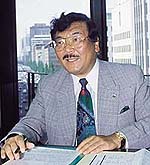Do you have any other opinions regarding attorneys?
I hope we can change the system which obligates lawyers to get a
permission from the Bar Association when they become an employee or manager
of a corporation. This is something that should be up to the individual.
In the U.S., out of 850,000 lawyers, it is assumed 150,000 work for in-house
legal departments. In Japan, we can perhaps assume that the number of
in-house attorneys is around thirty-five to forty. Based on the current
ratio for lawyers in the U.S. and Japan, we should at least have 3,000
attorneys working for in-house legal departments out of 17,000 practicing
attorneys. I hope, in the near future, we will see or we would seek an
image of progressive lawyers which practice out-of-court procedures to use
their ability and knowledge in new fields within Japan.
If we look into the underlying problem of these issues, it leads us to
re-think the Practicing Attorneys Act. There is a criticism that the Japan
Federation of Bar Associations is craven to revise the Practicing Attorney
Act due to its fear of losing the right to self-regulation for practicing
attorneys. Of course, self-regulation is a very important aspect. However,
practicing attorneys are only worthwhile when they serve society, not
because they have self-regulation. It is time to shed the concept that the
objective for practicing attorneys is to maintain self- regulation
Sustaining self-regulation does not automatically reject the notion that we
cannot revise the Practicing Attorneys Act. If there are parts of the Act
which hinder practicing attorneys from becoming useful to society, then
these aspects should be changed.
|

If the general public perceives that self-regulation practicing
attorneys in the new judicial system is useful, naturally, they would
recognize it as such.
|
Yes, I would agree. Changing times have given birth to the Judicial
Reform Council. However, we must remember that we cannot take forever on
these issues. The judicial system in Japan is facing a crisis. If we let
things go beyond the year 2000 or 2005/2010, Japan will no longer have a
judicial system. People will assume that it is more beneficial if they had
trials outside Japan. Eventually, Japan could fall into bits and pieces
and die.
|

 |
Hideaki Kubori(Hibiya Park Law Office)
Mr. Kubori passed the bar exam in 1967. In March 1968, he graduated from
Tokyo University's Faculty of Jurisprudence and registered as a practicing
attorney in 1971. He has served a one year term as the co-chairman of the
Second Tokyo Bar Association, as a committee chairman of the Japan
Federation of Bar Associations Training and a as lecturer at Tokyo
University Graduate School's Faculty of Jurisprudence Political Science
Department. (Special Research Seminar on Commercial Law). He is the author
of Japan Changing into Legalized Society (published by Toyo Keizai Shinpo),
Frontline on Corporate Reorganization (co-author, published by Kyosei),
Frontline on Copyright Business (co-author, published by Chuo Keizai) and
others.
|
|
